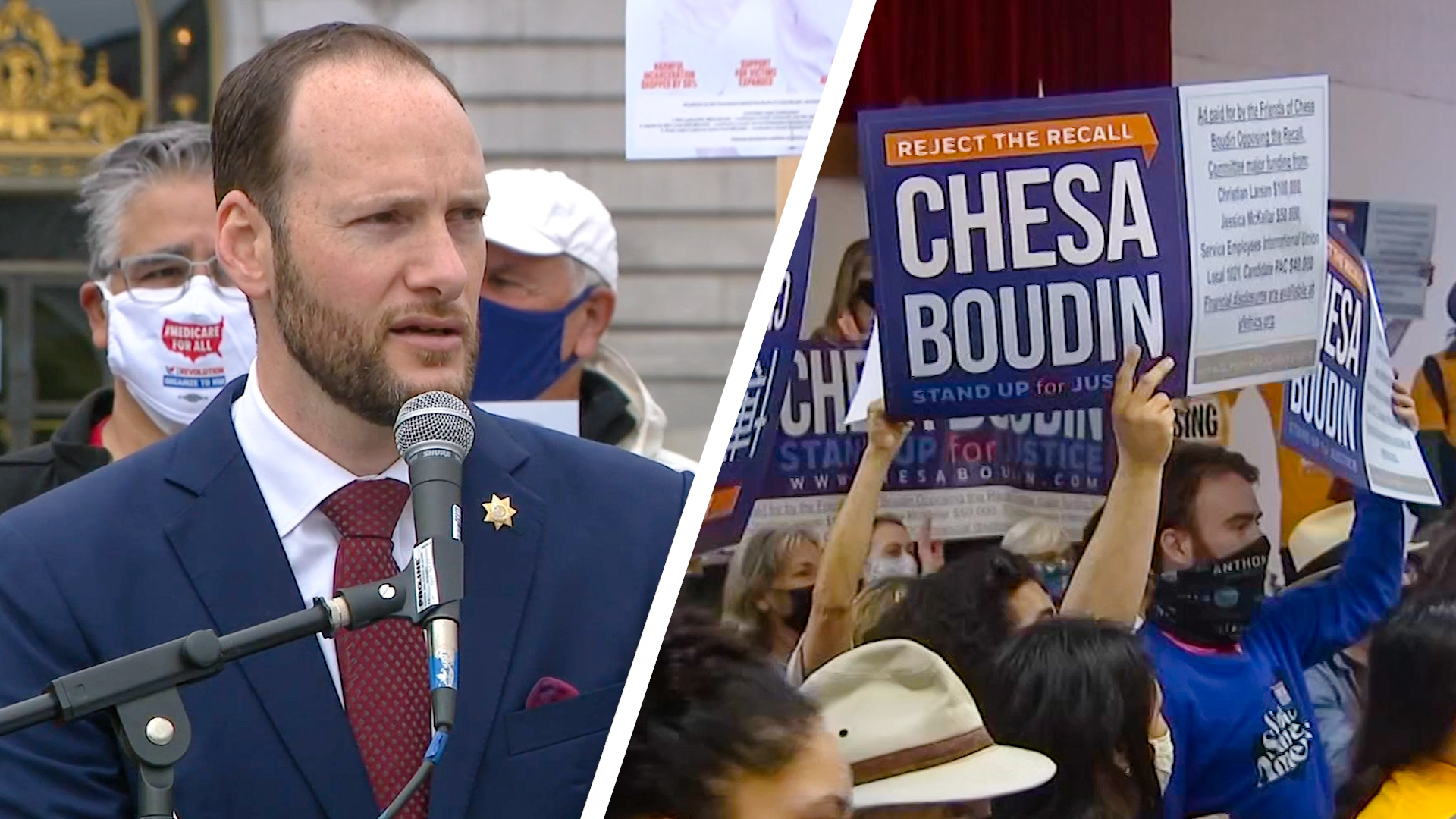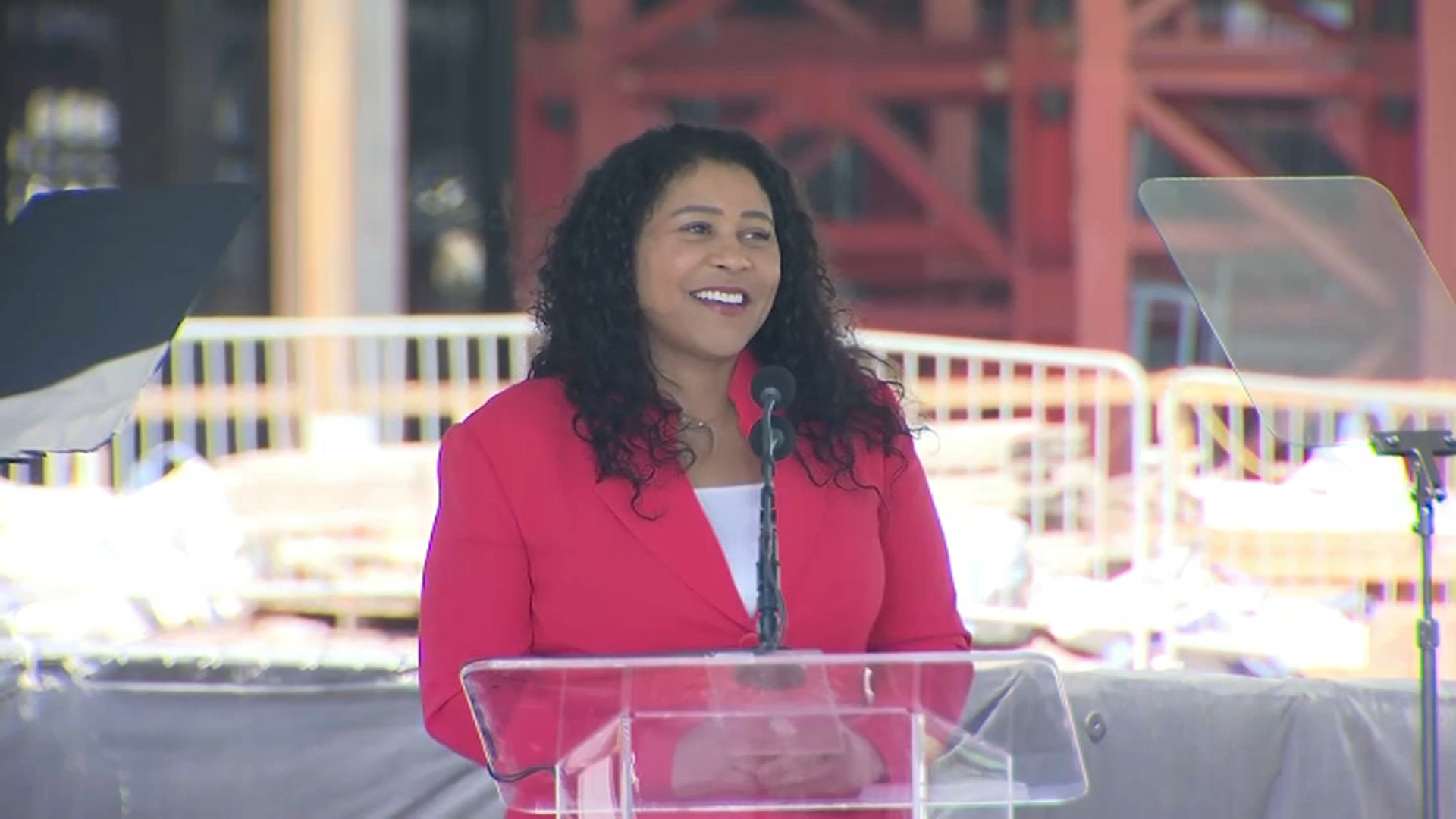San Francisco’s progressive district attorney, elected on a platform of reducing incarceration, faces a recall election driven by a pandemic in which brutal attacks against Asian seniors and viral footage of smash-and-grab robberies tested residents’ famously liberal political bent.
Recall proponents say Chesa Boudin is inexperienced and ideologically inflexible, often seeking to avoid charging criminals and siding with offenders over victims. His prosecutors are not permitted to seek cash bail, try juveniles as adults or seek longer sentences for perpetrators with gang affiliations.
The June 7 recall has pitted Democrat against Democrat in this city of not quite 900,000 people where reports of burglary and motor theft are up from 2017, but overall reported crime is down. Recall proponents have raised more than $7 million — double what his supporters have collected — with funding from the real estate industry and a conservative billionaire.
Boudin's supporters say his platform is in line with voters who approved measures to reduce sentences. They say conservative interests have exploited high-profile tragedies to make everything Boudin’s fault when crime rates are much higher in districts with traditional law-and-order prosecutors.
Get a weekly recap of the latest San Francisco Bay Area housing news. Sign up for NBC Bay Area’s Housing Deconstructed newsletter.
Political experts, and Boudin himself, say he's bearing the brunt of general angst.
San Francisco residents have long accepted a middling public school system, homeless encampments and open drug dealing as part of city life. But the pandemic amped up dissatisfaction as schools remained closed to in-person instruction while city and police officials appeared indifferent to graffiti and vandalism.
“Part of it is a tremendous amount of understandable frustration and anxiety that people have felt in the context of COVID, uncertainty about the direction our country’s headed, anger at the Trump administration and misinformation that administration fueled on everything from public safety to vaccines,” Boudin told The Associated Press.
The vote also comes at a time when recalls are increasingly being used in California, said Joshua Spivak, a recall expert who is with the Hugh L. Carey Institute for Government Reform at Wagner College in New York City.
Gov. Gavin Newsom easily survived a recall in September, but three members of the San Francisco school board were ousted in February.
“Boudin was elected in a very, very close race,” Spivak said. “He’s somebody who was kind of a perfect target for a recall challenge.”
Boudin's office has been locked in open battle with San Francisco police, which accused his office of withholding evidence in a case against an officer. Boudin says police often fail to bring thorough cases to the DA's office for prosecution, making arrests in just 5% of cases. He made headlines when he disclosed that police had used DNA collected from a rape to arrest the victim in an unrelated property crime.
He is backed by the San Francisco Democratic Party and most of the 11-member Board of Supervisors. Mayor London Breed, however, has declined to take a position on the recall, highlighting political divisions in a Democratic city where leaders embrace immigrant and gay rights but have fought over police accountability and cracking down on drug dealing.
Boudin, 41, had never worked as a prosecutor when in November 2019, he eked out a 51% win over the more moderate candidate backed by the mayor.
Many were captivated by his personal story. Boudin was a baby when his parents, left-wing Weather Underground radicals, served as drivers in a botched 1981 robbery that left two police officers and a security guard dead. They were sentenced to decades in prison.
On the campaign trail, he spoke of the pain of stepping through metal detectors to hug his parents and vowed to reform a system that tears apart families. Kathy Boudin was released on parole in 2003 and died of cancer in May. David Gilbert was granted parole in October.
The honeymoon period in office was short-lived.
An allegedly intoxicated parolee driving a stolen car hit and killed two pedestrians on the final day of 2020. Critics say the driver had been arrested multiple times that year and should have been in jail, but Boudin’s office had declined to press charges for burglary, drug possession and car theft. Instead they referred him to state agents who didn't revoke his parole.
Boudin spokesperson Rachel Marshall said the case prompted the DA's office “to begin charging parole violations ourselves rather than relying on parole to do it."
Former prosecutor and recall supporter Brooke Jenkins said the office under the previous district attorney was progressive. But unlike Boudin, she said, George Gascón gave prosecutors discretion and allowed them to insist on onerous treatment programs as conditions of avoiding jail time.
“We are conditioning people to believe they can do whatever they want in San Francisco with no consequences,” Jenkins said. “I think San Francisco sees the need for a little bit more balance to social justice and criminal justice issues.”
Leanna Louie, a Democrat campaigning for the recall, said she was outraged Boudin's office released to home treatment a young man who viciously kicked an elderly Chinese man sitting on a walker, severely injuring him.
“I think everybody could do better. But this, this is the worst,” Louie said. “Chesa is probably the least helpful person in this whole process.”
Marshall said the defendant was jailed for about seven months at the request of the DA's office. His attorney then requested he be transferred to mental health diversion, which the judge granted, she said.
It's unfair to single out Boudin in a complicated system that relies on judges, police and social services to do their parts, his supporters say.
Rico Hamilton, a longtime advocate for ending street violence who was shot last year, was among Black, Asian American and Latino leaders at a recent news conference against the recall.
“We are the leaders of change,” Hamilton said. “And us saying that we don’t want Chesa is saying that we don’t want to change the system."
At a former tanning salon in the city’s gay-friendly Castro neighborhood that is Boudin's campaign headquarters, the district attorney expressed pride in what his office has achieved while in a pandemic that drastically cut access to treatment, counseling and courtrooms.
His office filed charges in 62% of arrests brought by San Francisco police in 2021, up from a low of 45% his first year and on par with years dating back to 2016, according to the office’s annual report. Reported crimes include burglary, robbery, vandalism and theft but not homicides, sexual assaults and domestic violence.
At the same time, his office expanded the percentage of defendants who successfully completed diversion programs, some of which are mandated by the state, to avoid incarceration. In May, he announced a new Asian American Pacific Islander victim services unit.
Last year, Boudin sued manufacturers and shippers of ghost guns, weapons popular with criminals made from parts bought online. His office pursued assault and battery charges against an on-duty San Francisco police officer, although a jury acquitted him. While opponents have cited high turnover in his office, Boudin said he has no problem filling vacancies.
“There’s a playbook that Republicans and police unions across the country are using to attack criminal justice reform. They exploit tragedies to suggest that those tragedies are a result of reforms,” Boudin said. “They don’t do that in tough-on-crime jurisdictions where the exact same tragedies occur, with more frequency.”




